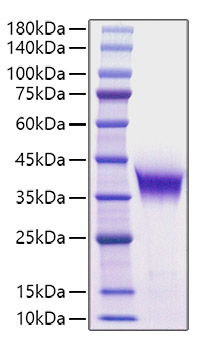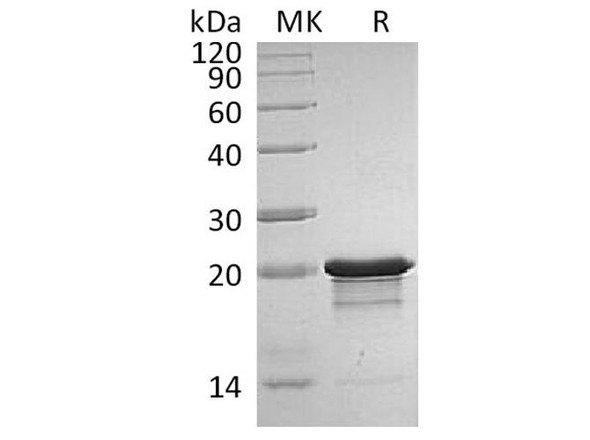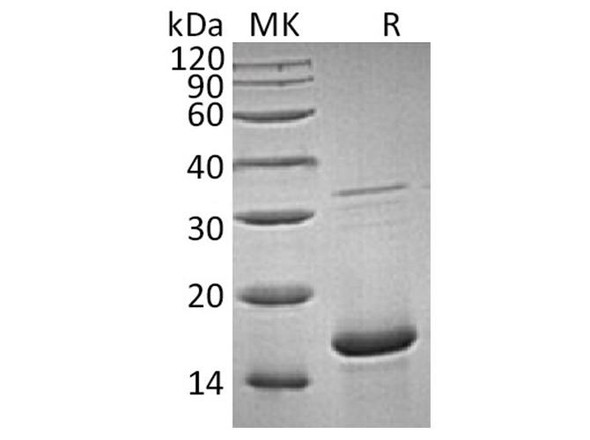Description
Recombinant Human/Mouse FGF-8B Protein
The Recombinant Human/Mouse FGF-8B Protein is a biologically active recombinant protein that plays a significant role in various cellular processes and signaling pathways in human biology. This protein is widely employed in immunological research, cell biology studies, protein-protein interaction analyses, and therapeutic development, providing researchers with a reliable tool for investigating Recombinant Human/Mouse FGF-8B function and its implications in health and disease.
This product (SKU: RPCB1309) is produced using HEK293 cells and features a C-6His tag for convenient detection and purification. The protein exhibits a calculated molecular weight of 23.23 kDa with an observed molecular weight of 35-45kDa under denaturing conditions, achieving ≥ 95 % as determined by SDS-PAGE., ensuring exceptional quality and consistency for research applications.
Key Features
| High Purity by Affinity Chromatography | |
| Mammalian & Bacterial Expression Systems | |
| High lot-to-lot consistency via strict QC |
| Product Name: | Recombinant Human/Mouse FGF-8B Protein |
| SKU: | RPCB1309 |
| Size: | 10 μg , 20 μg |
| Reactivity: | Human/Mouse |
| Synonyms: | HH6, AIGF, KAL6, FGF-8, HBGF-8, FGF8B |
| Tag: | C-6His |
| Expression Host: | HEK293 cells |
| Calculated MW: | 23.23 kDa |
| Observed MW: | 35-45kDa |
| Gene ID: | 2253(B); 2253(B) (http://www.ncbi.nlm.nih.gov/entrez/query.fcgi?db=gene&cmd=Retrieve&dopt=Graphics&list_uids=2253(B)) |
| Protein Description: | High quality, high purity and low endotoxin recombinant Recombinant Human/Mouse FGF-8B Protein (RPCB1309), tested reactivity in HEK293 cells and has been validated in SDS-PAGE.100% guaranteed. |
| Endotoxin: | < 0.1 EU/μg of the protein by LAL method. |
| Purity: | ≥ 95 % as determined by SDS-PAGE. |
| Formulation: | Lyophilized from a 0.22 μm filtered solution of PBS, pH 7.4. |
| Reconstitution: | Centrifuge the vial before opening. Reconstitute to a concentration of 0.1-0.5 mg/mL in sterile distilled water. Avoid vortex or vigorously pipetting the protein. For long term storage, it is recommended to add a carrier protein or stablizer (e.g. 0.1% BSA, 5% HSA, 10% FBS or 5% Trehalose), and aliquot the reconstituted protein solution to minimize free-thaw cycles. |
| Storage: | Store at -20℃.Store the lyophilized protein at -20℃ to -80 ℃ up to 1 year from the date of receipt. After reconstitution, the protein solution is stable at -20℃ for 3 months, at 2-8℃ for up to 1 week. |
In mammalian embryos, transient Fgf8 expression defines the developing isthmic region, lying between the midbrain and the first rhombomere, but there has been uncertainty about the existence of a distinct isthmic segment in postnatal mammals. Retinoic acid (RA) directly represses Fgf8 through a RARE-mediated mechanism that promotes repressive chromatin, thus providing valuable insight into the mechanism of RA-FGF antagonism during progenitor cell differentiation. Fgf8 encodes a key signaling factor, and its precise regulation is essential for embryo patterning.







